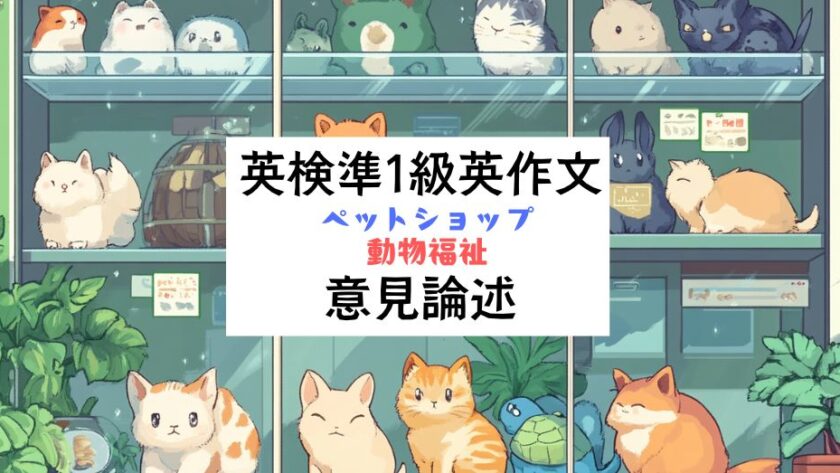練習問題<分野:倫理・社会>
TOPIC
Agree or Disagree: Pet shops should continue to exist.
POINTS
● Animal welfare
● Commercialization of pets
● Adoption alternatives
● Consumer awareness
観点と切り口
- Animal welfare(動物福祉)
賛成:ペットショップは適切な管理のもと、動物に必要なケアや保護を提供し、家庭での新しい飼い主を見つける場を提供している。
反対:多くのペットショップでは、狭いスペースでの生活や健康管理の不十分さなど、動物福祉の観点で問題が多く、動物が不適切に扱われることがある。 - Commercialization of pets(ペットの商業化)
賛成:ペットショップは動物関連産業を支え、雇用を創出するなど、経済に貢献している。
反対:動物を商品として扱うことは倫理的に問題があり、動物の命を金銭的な利益のために売買する行為は許されるべきではない。 - Adoption alternatives(里親制度の代替案)
賛成:ペットショップは特定の種類や性格のペットを購入したい消費者に選択肢を提供しているため、個別のニーズに応えることができる。
反対:ペットの入手は、里親制度や保護施設からの引き取りを優先すべきであり、商業的に繁殖された動物を購入することは推奨されない。 - Consumer awareness(消費者の意識)
賛成:ペットショップは消費者に対してペットの飼育方法や責任について啓発する役割を果たしており、適切な飼育環境を広める一助となっている。
反対:消費者はペットショップの動物の出所や育成環境について十分な情報を得られないことが多く、無意識に不適切な繁殖業者を支援してしまう可能性がある。
観点毎のキーワード例
Animal Welfare
- Humane treatment – 人道的な扱い
- Overcrowded cages – 過密なケージ
- Veterinary care – 獣医ケア
- Stress from confinement – 監禁によるストレス
- Animal rights – 動物の権利
- Health standards – 健康基準
- Breeding conditions – 繁殖環境
Commercialization of Pets
- Profit-driven breeding – 利益優先の繁殖
- Pet overpopulation – ペットの過剰繁殖
- Mass production – 大量生産
- Emotional connection – 感情的な繋がり
- Ethical business practices – 倫理的なビジネス慣行
- Pet as commodity – ペットの商品化
- Sales regulations – 販売規制
Adoption Alternatives
- Animal shelters – 動物保護施設
- Rescue organizations – 救助団体
- Fostering programs – 里親プログラム
- Overcrowding in shelters – シェルターの過密
- Adopt, don’t shop – 買うのではなく里親になる
- Adoption incentives – 里親制度の促進
- Spay/neuter programs – 避妊去勢プログラム
Consumer Awareness
- Pet care education – ペットケアの教育
- Informed purchasing decisions – 情報に基づいた購入判断
- Transparency in sourcing – 調達の透明性
- Impulse buying – 衝動買い
- Pet ownership responsibilities – ペット所有の責任
- Consumer protection laws – 消費者保護法
- Ethical consumerism – 倫理的消費
肯定派の論理展開
ピンク背景色がトピックセンテンス。段落最初にこれを書き、それを論理的に説明するのが定番です。
- イントロ(結論):
ペットショップの存在に賛成する、ペットショップはペットを見つける手軽な手段を提供し、動物ケアについての消費者意識を高める。 - ボディ1(トピックセンテンス):
ペットショップは責任あるペット飼育に関する教育を行う。
多くのペットショップは、動物の飼育方法についての情報を提供している。
餌や健康管理、トレーニングなどの知識を得ることで、新しい飼い主がペットの世話を適切にできる。
その結果、動物福祉が向上する。 - ボディ2(トピックセンテンス):
ペットの商業化は、必ずしも悪いことではない。
ペットショップは規制された市場を提供し、責任ある供給元からペットを取り扱うことができる
さらに、ペットを合法的に購入できるため、飼い主にとっても安心できる。 - 結論(まとめ):
ペットショップは、責任あるペット飼育を促進し、動物福祉や消費者教育に貢献する。
ペットショップ肯定派
I agree with the existence of pet shops because they provide an accessible way for people to find pets and increase consumer awareness about animal care.
First, pet shops play a role in educating customers about responsible pet ownership. Many shops offer information on proper animal care, such as feeding, health, and training. This guidance helps new pet owners understand how to care for their pets, ensuring better animal welfare in the long run.
Second, pet shops contribute to the commercialization of pets, but this is not necessarily negative. By providing a regulated marketplace, pet shops can ensure that animals are sourced responsibly and treated well. Additionally, it makes it easier for people to find and purchase pets legally.
In conclusion, pet shops can promote responsible pet ownership and provide a controlled environment for purchasing pets, which supports both animal welfare and consumer education. (144 words)
肯定派の日本語訳
ペットショップの存在に賛成である。ペットショップは、人々がペットを見つけるためのアクセスしやすい手段を提供し、動物のケアに関する消費者の意識を高める役割を果たしているからだ。
まず、ペットショップは責任あるペットの飼い方を顧客に教育する役割を担っている。多くの店舗では、餌の与え方や健康管理、トレーニングなど、適切な動物ケアに関する情報を提供している。この指導は、新しいペットの飼い主がペットの世話を正しく理解し、長期的に動物の福祉を向上させる助けとなる。
次に、ペットショップはペットの商業化に寄与しているが、これは必ずしも悪いことではない。規制された市場を提供することで、ペットショップは動物が責任を持って供給され、適切に扱われることを保証できる。また、合法的にペットを見つけ、購入するための手段を簡単に提供している。
結論として、ペットショップは責任あるペットの飼育を促進し、管理された環境でペットを購入できる場を提供することで、動物福祉と消費者教育の両方を支えている。
否定派の論理展開
- イントロ(結論):
ペットショップの存在には反対する。動物福祉の問題や、里親制度の代替案があるためである。 - ボディ1(トピックセンテンス):
ペットショップは利益を優先し、動物福祉が犠牲になることがある。
多くのペットショップは、大規模な繁殖施設から動物を仕入れている。
これらの施設では、動物の健康や福祉よりも数を重視しているため、悪環境や社会化不足、健康問題が発生しやすい。
その結果、飼い主にとっても問題が生じることが多い。 - ボディ2(トピックセンテンス):
シェルターからの里親制度は、より倫理的な代替案である。
シェルターには多くの家を必要とする動物がいる。
里親になることで、過剰な繁殖や動物の安楽死の問題が減少する。
ペットを購入するのではなく、里親を促進することで、動物が商業製品のように扱われなくなる。 - 結論(まとめ):
動物福祉への懸念や、里親制度という代替案があるため、ペットショップの存在には反対である。
ペットショップ否定派
I disagree with the existence of pet shops due to concerns about animal welfare and the availability of adoption alternatives.
First, pet shops often prioritize profit over animal welfare. Many animals in pet shops come from large-scale breeding facilities where the focus is on quantity rather than the health and well-being of the animals. These animals may suffer from poor living conditions, lack of socialization, and health problems, which can lead to long-term issues for both the pets and their owners.
Second, adoption from shelters is a more ethical alternative. Many animals in shelters are in need of homes, and adopting them helps reduce overpopulation and the number of animals being euthanized. Promoting adoption over purchasing pets from stores can ensure that more animals find loving homes and are not treated as commercial products.
In conclusion, due to animal welfare concerns and the availability of adoption alternatives, I believe pet shops should not exist. (154 words)
否定派の日本語訳
ペットショップの存在には反対である。動物福祉の懸念や、養子縁組の代替手段が存在するためである。
まず、ペットショップは利益を優先し、動物福祉を軽視する傾向がある。多くのペットショップの動物は、大規模な繁殖施設から供給されており、そこでの重点は動物の健康や福祉よりも数を優先している。この結果、動物は劣悪な生活環境や社会化の不足、健康問題に苦しむことがあり、これがペットや飼い主に長期的な問題をもたらすことがある。
次に、シェルターからの譲渡はより倫理的な選択肢である。シェルターには多くの動物が新しい家を必要としており、譲渡を通じて過剰繁殖や安楽死される動物の数を減らすことができる。ペットショップでの購入ではなく、譲渡を促進することで、より多くの動物が愛情ある家を見つけ、商業商品として扱われることを避けられる。
結論として、動物福祉の問題や養子縁組という選択肢があるため、ペットショップは存在すべきではないと考える。
4つの観点と例文
1. Animal Welfare (動物福祉)
肯定的:
- proper care (適切なケア)
“Pet shops provide proper care for animals.”
「ペットショップは動物に適切なケアを提供しています。」 - shelter environment (保護環境)
“They offer a safe shelter environment for pets.”
「ペットショップはペットに安全な保護環境を提供します。」
否定的:
- neglect (怠慢)
“Some pet shops are criticized for neglecting animal welfare.”
「一部のペットショップは動物福祉を怠っていると批判されています。」 - stressful conditions (ストレスの多い環境)
“Pet shops often keep animals in stressful conditions.”
「ペットショップはしばしば動物をストレスの多い環境で飼育しています。」
2. Commercialization of Pets (ペットの商業化)
肯定的:
- pet industry growth (ペット産業の成長)
“The pet industry’s growth supports local economies.”
「ペット産業の成長は地域経済を支えています。」 - job creation (雇用創出)
“Pet shops contribute to job creation in the community.”
「ペットショップは地域社会で雇用を創出しています。」
否定的:
- profit-driven (利益優先)
“Pet shops are often criticized for being profit-driven.”
「ペットショップは利益優先だと批判されることが多いです。」 - exploitation (搾取)
“Commercializing pets leads to exploitation of animals.”
「ペットの商業化は動物の搾取につながります。」
3. Adoption Alternatives (里親制度の代替)
肯定的:
- rescue partnerships (救助団体との提携)
“Some pet shops partner with rescue organizations for adoptions.”
「一部のペットショップは、救助団体と提携して里親制度を導入しています。」 - increase adoption rates (里親率の向上)
“Pet shops can help increase adoption rates by offering shelter pets.”
「ペットショップは保護動物を扱うことで里親率を向上させることができます。」
否定的:
- overlook adoption (里親制度を無視する)
“Pet shops often overlook adoption as a viable option.”
「ペットショップは里親制度を無視しがちです。」 - promote buying (購入を促進する)
“They promote buying pets instead of adopting.”
「ペットショップは購入を促進し、里親を勧めません。」
4. Consumer Awareness (消費者の意識)
肯定的:
- educate customers (顧客を教育する)
“Pet shops can educate customers about responsible pet ownership.”
「ペットショップは、顧客に責任あるペットの飼い方を教育できます。」 - transparent sourcing (透明な仕入れ)
“Some shops promote transparent sourcing of pets.”
「一部のペットショップは、透明な仕入れを推奨しています。」
否定的:
- mislead consumers (消費者を誤解させる)
“Pet shops may mislead consumers about the origins of animals.”
「ペットショップは動物の出所について消費者を誤解させることがあります。」 - lack of information (情報不足)
“Many customers lack information on the ethical aspects of buying pets.”
「多くの顧客は、ペットを購入する際の倫理的な側面についての情報が不足しています。」
こちらの記事もおススメです:要約問題|携帯電話の歴史:長文・回答例・観点・言い換えリスト
英検準1級英作文対策はask本校のオンライン個別指導がおススメです。




